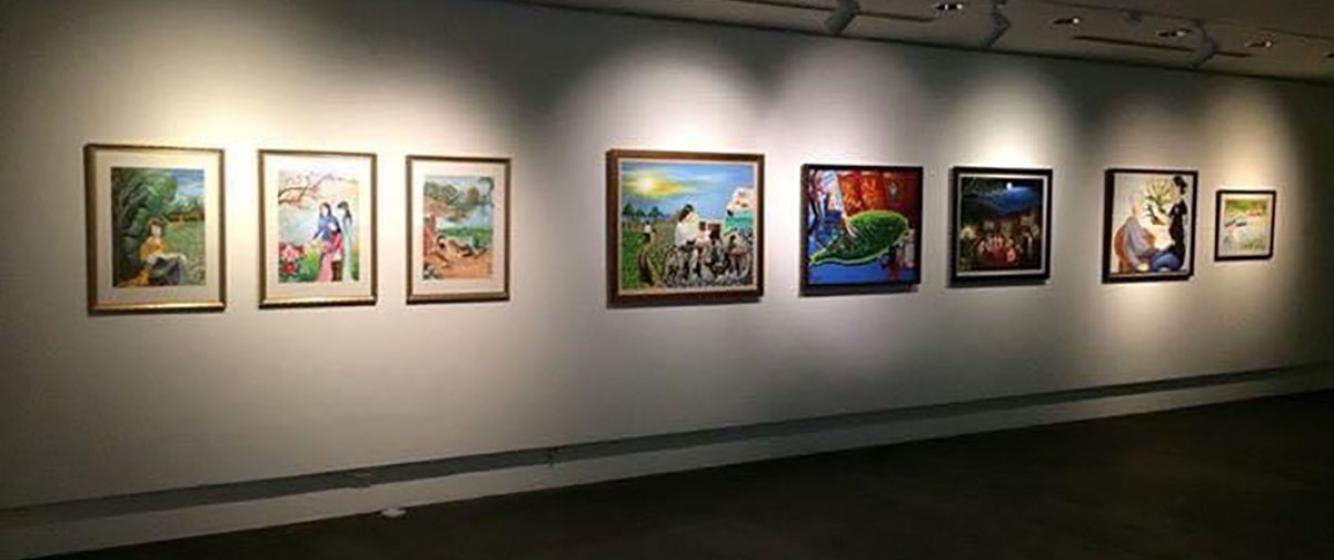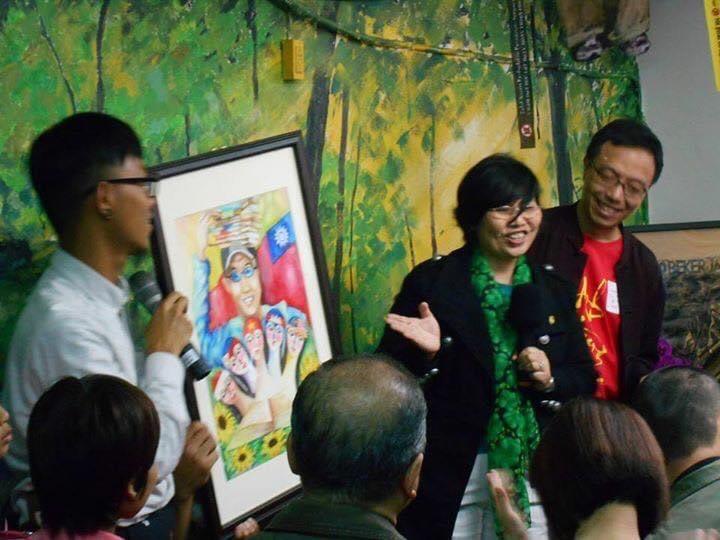
Waiting for spring to arrive in my life in Taiwan
The following narrative was constructed by Isabelle Cockel, based on an interview that she conducted with Trần Thi Đào , a former Vietnamese caregiver based in Taipei.
I went to Taiwan on 15 September, 2002, after watching a TV advertisement that was recruiting caregivers in Taiwan. At that time, I was a coffee grower and trader. Such a business involves many people; sometimes I sold and exported as much as 30 tons of coffee. Prior to that time, the heavy rain that had lasted more than a month made it very difficult to dry and roast coffee beans. Coffee farmers and traders like myself suffered a great deal of financial loss as a result. The advertisement attracted my attention because I had actually been trained as a nurse. Before my marriage, I worked in the midwifery department at a hospital. The wage was low and the work was hard, so I quit my job and turned to coffee growing and exporting.
The broker told me that I would be hired to look after patients in Taiwan. I began to work at a care institution but, later on, I was hired by a family to look after an old woman at her home. The broker told me that in Taiwan, I would be paid NT 17,000 dollars per month. In reality, they only paid me NT 3,000 dollars. Further, on paper, I was hired to look after an old woman when in fact I also worked for my employer’s business. My employer’s family ran a meat, fish, and vegetable stall in an open market. They went to the wholesale market around two every morning and resold their purchases at a neighbourhood market that day. The son brought me and his mother, my patient, to their stall and asked me to work there whilst looking after his mother. At the stall, I chopped meat and ribs, and cleaned the vegetables, but I was also trying to keep an eye on his mother. If she left the stall, I was told off for not keeping an eye on her. Around noon, we packed up our goods and I took the old woman for a walk, often under the scorching sun. After we returned to the house, I cooked, cleaned the house, and tidied up the unsold produce.
I did not get any rest, nor did I get paid. I did not receive the NT 17,000 dollars shown on my contract, nor did I receive the reduced salary of NT 3,000 dollars. My salary was deducted because the rest was retained by my broker for my recruitment fee. I did not understand why this happened to me and wanted to get help. I thought I could contact the Taiwanese government but I could not use a telephone. My employer did not allow me to use their phone. I cried a lot and my employer reported this to my broker. My broker told me I had to go back to Vietnam. They showed me that on my employment record, I had been transferred from broker to broker six times. How strange this was: I had only worked in two places since arriving in Taiwan. On paper, however, I had been handled by six Taiwanese brokers. I could not speak Chinese and the broker came with a Vietnamese interpreter, both of whom deceived me.
It was hard in Taiwan but returning home empty handed would be even worse. My children were young and my husband did not work. I could not go home but my broker was keen to see me gone. I did not speak much Chinese and did not understand why I had to go. Only much later did I realise that to process my recruitment again, I would have to give the brokers an extra recruitment fee, between US $5,000 and $6,000.
After working in Taiwan for nothing, I returned home penniless. A Vietnamese broker, Mr Li, took pity on me. He gave me US $100 and told me I could use this money to buy gifts for my children. I spent $80 for my trip from Hanoi back home and the remaining $20 was spent in presenting offerings to my late parents at their tomb.
Years later, in Vietnam, I sued my Taiwanese broker for unlawfully confiscating my salary; I demanded compensation of US $2,000. The Vietnamese police officer who received my case was a woman and it took her more than a year to process my case because she was pregnant. She contacted the Taiwanese police and a Taiwanese officer contacted me a week later. He informed me that my broker had gone bust and had no money to pay the salary retained by him. The broker could only return US $700 to me. ‘Take it or have nothing from the bankrupt broker’ was the advice he gave me. I decided to take it and closed the complaint.
After returning home to Vietnam, my children saw me crying often because I felt so helpless. I decided to return to Taiwan via another broker in Hanoi. I was accepted and I worked in the broker’s office for a month. I cooked for their trainees, as many as 36 in that month, whilst waiting for them to secure a contract for me. A month later, I came to Taiwan for the second time. I was hired to look after a man who had suffered a stroke and a leg injury for several years. He was also troubled by constipation, which left him in agony most of the time, particularly during the night when his pain and frustration turned into howling. I used my nursing skills to look after him. His condition improved, including his constipation, and his medication was reduced as a result. Taiwanese nurses praised my skills and success. My patient appreciated my help very much but his daughter did not see it in the same way. She would return home from work around midnight, and if she saw me going to bed before she came home, she told me off. My patient had four adult children and each one of them had their own children. Looking after my patient also meant being a domestic worker and nanny for his children and grandchildren. I cleaned their four houses and looked after my patient’s grandchildren. By then I had worked in Taiwan for several years but I did not speak much Chinese because I spent most of my time working, without communicating with people outside my work. I told my broker I could not carry on working like this anymore. The family agreed to release me and I was paid NT 3,000 dollars per month, not 17,000, for the whole time of three years I worked for them. I wanted to buy a house in Vietnam but the price of gold went up so much that I could not afford to buy a house with my savings. As a result, I decided to take out another contract, my third time.
It was during these difficult times that I started drawing. There was a small park opposite my employer’s house where Indonesian, Thai, and Vietnamese caregivers met and socialised. One of them gave me a newspaper published in five Southeast Asian languages. The newspaper was published on the 15th day of the month. Seeing a newspaper published in Vietnamese was touching and it was more so to see the paintings and writings of my fellow Vietnamese migrants published in the newspaper. I started drawing too. I did it after I finished work at my employer’s business, after I cleaned their house, and after my patient went to bed for the night. I sent in my works to the newspaper.
I was 36 years old around that time. As a young woman, wife, and mother, I saw my youthful years vanished day after day in Taiwan; as a migrant worker, I did not know when I could go home to kiss my children and give them a hug. Life seemed to be unfairly hard for a Vietnamese woman; it seemed so much easier to be a Vietnamese man. I was waiting for spring to come to my life. I started drawing with pencils on any paper I could get hold of. I drew a lot and sent my drawings to the newspaper; I was overjoyed to see them publishing my works. The newspaper editors came to visit me and organised several exhibitions for me. I began to submit my work to competitions or exhibitions and I won awards several times. My employer allowed me to attend these award-giving ceremonies in order for me to get my recognition.

My last employer encouraged me to carry on with my artwork. He particularly encouraged me to practise Chinese calligraphy and bought me a practice book for that. I did not have paints or colour pencils and I did not know where to purchase such materials. A pharmacist in a neighbouring town saw my work in the newspapers and wanted to support me. He contacted the newspaper to get my contact details and he got permission from my employer to visit me. He came quite late because his car broke down on the way; he immediately took me to a nearby department store and bought paints, brushes, and paper. His encouragement and generosity allowed me to do more.
During my third contract in Taiwan, I worked hard in order to pay for my daughter’s tuition fees for her university education in Taiwan. She is in her early thirties now, running a recruitment agency. She works with Taiwanese brokers and I help her with training prospective caregivers. I have met so many vicious brokers and I hope we can help people find jobs in Taiwan without going through the same problems I have encountered in the past. We also charge fees. We do not have many clients and we take great care of our workers. Some of our workers ‘ran away’; out of 100 workers sent by us, three left their contracts immediately after they arrived in Taiwan. They had contacts in Taiwan before they went and these contacts told them they could find work for them. I talked to one of them, explaining to her what kind of risk she would encounter: she would not be able to go to see a doctor if she was sick; she would not get help from the government. She took my advice and returned to her work. She later thanked me for advising her to stay.
I have returned to Vietnam for a while after working in Taiwan for three contracts. For my artwork, I started painting subjects beyond my experiences. I see myself as an artist now.
Add new comment